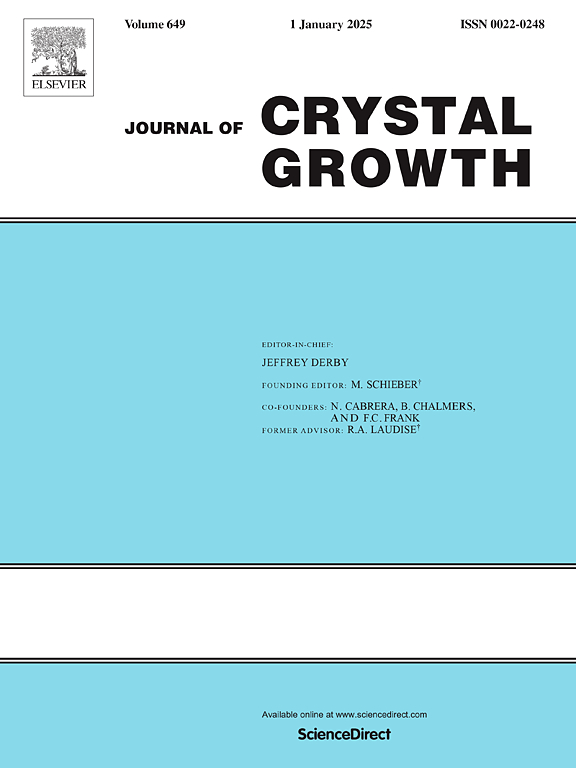The impact of cooling rate on the structure and properties of VGF-InP single crystals
IF 1.7
4区 材料科学
Q3 CRYSTALLOGRAPHY
引用次数: 0
Abstract
InP is a III-V compound semiconductor with a zinc-blende crystal structure, widely used in optical communications, high-frequency millimeter-wave devices, optoelectronic integrated circuits, and solar cells. During the growth of VGF-InP single crystals, defects such as twinning, dislocations, and polycrystals are prone to occur. Experimental research on the cooling rate, an important control condition during the growth process, was conducted. By analyzing a large amount of discrete cooling data from the premium InP production and using spherical fitting algorithms for numerical analysis, the optimal cooling curve was obtained. Forward and reverse experimental verification results show that by adjusting the cooling rate at each growth stage, the recurrence of twinning and dislocations was successfully improved. Increasing the cooling rate during the shouldering process helps suppress intrinsic twinning but tends to increase dislocation density during the equal diameter stage process, leading to dislocation proliferation. Therefore, while increasing the cooling rate during shouldering, it is necessary to appropriately reduce the cooling rate during the equal diameter stage process to effectively suppress dislocation proliferation. By precisely controlling the temperature gradient and cooling rate inside the furnace, the thermal field conditions during the crystal growth process can be optimized, significantly improving the quality of InP single crystals.
冷却速率对 VGF-InP 单晶的结构和性质的影响
InP 是一种具有锌蓝晶结构的 III-V 族化合物半导体,广泛应用于光通信、高频毫米波器件、光电集成电路和太阳能电池。在 VGF-InP 单晶生长过程中,容易出现孪晶、位错和多晶等缺陷。冷却速率是生长过程中的一个重要控制条件,对其进行了实验研究。通过分析大量优质 InP 生产的离散冷却数据,并使用球形拟合算法进行数值分析,得到了最佳冷却曲线。正向和反向实验验证结果表明,通过调整每个生长阶段的冷却速率,成功地改善了孪晶和位错的复发。在肩化过程中提高冷却速率有助于抑制本征孪晶,但在等径阶段过程中往往会增加位错密度,导致位错扩散。因此,在肩扛过程中提高冷却速率的同时,有必要在等径阶段过程中适当降低冷却速率,以有效抑制位错扩散。通过精确控制炉内的温度梯度和冷却速率,可以优化晶体生长过程中的热场条件,从而显著提高 InP 单晶的质量。
本文章由计算机程序翻译,如有差异,请以英文原文为准。
求助全文
约1分钟内获得全文
求助全文
来源期刊

Journal of Crystal Growth
化学-晶体学
CiteScore
3.60
自引率
11.10%
发文量
373
审稿时长
65 days
期刊介绍:
The journal offers a common reference and publication source for workers engaged in research on the experimental and theoretical aspects of crystal growth and its applications, e.g. in devices. Experimental and theoretical contributions are published in the following fields: theory of nucleation and growth, molecular kinetics and transport phenomena, crystallization in viscous media such as polymers and glasses; crystal growth of metals, minerals, semiconductors, superconductors, magnetics, inorganic, organic and biological substances in bulk or as thin films; molecular beam epitaxy, chemical vapor deposition, growth of III-V and II-VI and other semiconductors; characterization of single crystals by physical and chemical methods; apparatus, instrumentation and techniques for crystal growth, and purification methods; multilayer heterostructures and their characterisation with an emphasis on crystal growth and epitaxial aspects of electronic materials. A special feature of the journal is the periodic inclusion of proceedings of symposia and conferences on relevant aspects of crystal growth.
 求助内容:
求助内容: 应助结果提醒方式:
应助结果提醒方式:


